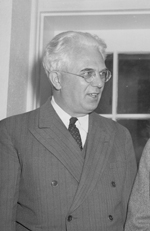Homer S. Ferguson
Homer Samuel Ferguson (born February 25, 1889 in Harrison City , Westmoreland County , Pennsylvania , † December 17, 1982 ) was an American lawyer and politician of the Republican Party .
Early life and legal career
Ferguson, who hails from a suburb of Pittsburgh , began studying law at the University of Pittsburgh after attending school . He later moved to the University of Michigan at Ann Arbor , where he graduated in 1913. He was inducted into the Bar that same year and began practicing in Detroit . In 1929 he became a judge in Wayne County County Court , which he remained until 1942; meanwhile he was also from 1929 to 1939 law lecturer at the Detroit College of Law (now part of Michigan State University ).
politics
In 1942 Homer Ferguson was elected for the first time for the Republicans in the US Senate ; six years later he was re-elected, so that he remained in Congress until January 3, 1955 ; then he had to cede his seat to the Democrat Patrick V. McNamara . During his tenure as Senator, he was the Republican Policy Committee in 1954 and was the fourth highest representative of the party hierarchy in the Senate. In the same year he introduced a bill according to which the addition "under God" (under God) should be introduced into the Pledge of Allegiance , and was successful with it.
After the time in the Senate
After leaving Congress, Ferguson was appointed US ambassador to the Philippines . After holding this office from 1955 to 1956, he returned to Washington , where he was a judge on the Court of Appeal for the US Armed Forces from 1956 to 1976 . After leaving, he moved back to Michigan and lived in Grosse Pointe until his death in 1982 .
Web links
- Homer S. Ferguson in the Biographical Directory of the United States Congress (English)
- Homer S. Ferguson in the database of Find a Grave (English)
- University of Michigan font collection
| personal data | |
|---|---|
| SURNAME | Ferguson, Homer S. |
| ALTERNATIVE NAMES | Ferguson, Homer Samuel (full name) |
| BRIEF DESCRIPTION | American lawyer and politician |
| DATE OF BIRTH | February 25, 1889 |
| PLACE OF BIRTH | Harrison City , Pennsylvania |
| DATE OF DEATH | 17th December 1982 |

